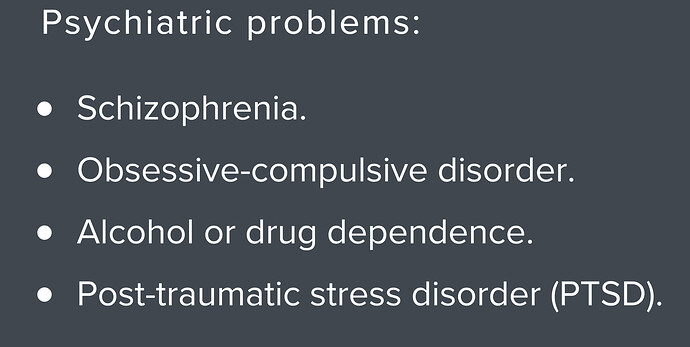I’ve got a couple of cadets on my unit who have ASD. I’d be interested in your presentation, if for no other reason than to see how a cadet feels it impacts on them and how you feel we can help.
I would also be interested in your presentation.
Have PM’d you an email address.
Yes please, I have two autistic cadets and would welcome info & advice. Thanks
I too would be interested in viewing this if it is still availible? Also how are things going?
Me too. In CCF cadets with ASD often gravitate to the RAF section (stereotype, but they tend to be more STEM oriented).
Doesn’t the school (assuming the CCF unit is part of a school) have a SEN dept to give the advice etc?
There are many cadets out there on the spectrum. Most are not known to the sqn staff unless the parents have said. Not knowing can put the staff and senior cadets in a very difficult position. Parents often push their children to join, some thrive on the order and discipline other push back. Some cant cope and cause huge problems on the Sqn.
Ultimately it is the decision of the OC whether a cadet with Autism can join the sqn. When I approached WHQ for guidance on allowing a cadet with severe learning difficulties I was told it was up to you whether you allow him/her to join. Is a RAFAC sqn the right place for cadets with autism? From past experience there can be a severe burden on staff who are doing their best but are mostly out of their depth.
I’ve always let them join in consultation with the parents and then I speak to staff. Parents know their children better than anyone.
Speaking to anyone at Wing or Region about it would be a waste of time, as the people given jobs like this on Wing are mainly squadron dodgers and given a job to justify their being.
Having held various roles like many of the good people on these boards I have mixed feelings on this. Frankly though I don’t think it should just be down to an OC to decide (They need to be heavily involved though). Otherwise how do we as a National Youth organisation then consistently create appropriate environments for young people to thrive. No this needs to be led from the top with supports put in place throughout regions. Give staff and Sqns the skills, tools and confidence to help as many people as possible get somthing from the air cadet experience.
my Daughter is Autistic - mainly it manifests as anxiety about any kind of change or demand placed on her, taking everything really, really literally, and having the reading and language skills of an adult at age 7. if you spoke to her you might think she was a bit nerdy, maybe didn’t understand social boundaries very well, but was happy, bouncy, and keen to be friends with people.
she goes to a standard primary school, she has a one-to-one specialist teaching assistant for most of the school day, the schools ancillary staff have all had Autism awareness training so they can see her little quirks, and she has a legally binding document called an EHCP (a Statement in old money…) that sets out where she is and what her needs are, where we, the school and her consultant want her to be in X and Y timeframe, the mechanics and strategies that are needed to accomplish that, and the resources (the important bit, the bit we use to take the Council to court if they don’t cough up!) that are required to achieve that.
i look forward to HQAC talking to the various departments for education to ensure that the basic Autism awareness training is available to CFAV’s, and talking to to OC’s to ensure that they know that can ask the parents about the childs needs and what strategies work for that child - and getting the various DfE’s to let the School SENCO’s and LA SEND’s know that they very much, as long as the parents wish it, ought to help Sqn staff with training and awareness.

I ask for EHCPs from parents when they tell me their children have additional needs - but I only know about them from my day job. We’re lucky in that I and other staff are allowed additional training through our employment to support people with SEND, not all squadrons will get that obviously.
Hi guys,
Can I just say when I first started this topic I never thought it would be so widely received and I’m very thankful for all the discussion on this topic. I believe that all squadrons should have the ability to take up training so they know more about disabilities like autism. As of now I am a Sgt (happy me, only took an arm and a leg  ) I hope that anyone with a disability in the air cadets feels that they can be open about it and if needed they can get support, personally I’d say to all those with autistic cadets just ask them what they need, if they don’t know that is okay but if they do it really is game changing.
) I hope that anyone with a disability in the air cadets feels that they can be open about it and if needed they can get support, personally I’d say to all those with autistic cadets just ask them what they need, if they don’t know that is okay but if they do it really is game changing.
Secondly I’m aiming for FS now and was actually wondering because I am now 19 am I eligible to skip to CWO I know a few people who have done it but I am unsure how to go about it. I have asked how to do this and have simply been turned away because my CO doesn’t think I could handle it however I have proved otherwise. I have 7 years of cadet experience and knowledge, I am being used as staff cover at Neijmegen this year and I have been staff at other events also. On top of this I teach and help teach majority of classes as well as running at least 70% of squadron nights. Staff from other squadrons have written me countless recommendations but I don’t think its doing anything (still thanks to all those who have written these supportive statements however). We have plenty of cadets so there is room for a CWO I just want to know how to apply and would be grateful for any suggestion.
Thirdly should autistic individuals join the air cadets, in short yes. The amount of structure and creativity an autistic cadet can bring to air cadets far outways the hindrance of not understanding them, if you support any cadet they will go miles just try and be there for them, for us. I’m probably a bit of a bias being an autistic myself but I’ve had to fight for myself with very little support for most of my teen life, I was diagnosed at 16 and from that day most people doubt my abilities, it’s not fair but I got on with it and have spent so much time proving others wrong. Some autistic people can’t fight against this, out of fear or just generally not knowing how. So to that I say support is key, all cadets are epic in there own way some just need a push.
Fourth I am sorry I haven’t managed to post that power point yet give me a week and I shall I’m just writing some more notes for it so that anyone who wishes to learn from it can really understand it because the power point itself is in normal MOI fashion, all pictures, videos and interactive activities.
To summaries thank you everyone for what I have found to be a very interesting discussion it really helps me to understands the concerns about people with autism, the training available, staff opinion and how to combat negative stereotypes without offering no help to the individual in question.
At age 19 you may also want to be considering your future with the corps (if any). If you plan on adult Service particularly uniformed you may wish to get the ball rolling sooner rather than later…
Hello,
Yes don’t worry I have already had this conversation too. I will be coming back as uniform staff and I start my paperwork in September  . I’ll be picking up road marching for wing and anything else I can help with as an officer hopefully.
. I’ll be picking up road marching for wing and anything else I can help with as an officer hopefully.
Aspergers cadet here. When my mom was filling in my joining paperwork she didn’t say anything about it, thinking she could tell the staff if it was an issue and not wanting it to impact me.
The blanket ban on people with autism in the armed forces really grinds my gears. It’s not an impediment, it can be an advantage in some cases. One military actively recruits people with high functioning autism for intelligence analysis.
Unfortunately the best of intentions isn’t always helpful to the staff at the squadron. If you spend some time on this forum you’ll see there’s a lot of staff that are passionate about helping and proud of the fact that we’re volunteers. We always do our best however it’s a lot easier to deal with any problems or situations that (may) arise if we are forearmed therefore forewarned.
As an example, if staff knew that a cadet was autistic, they would know to approach social situations in a different manner to someone who isn’t autistic but maybe a bit awkward.
I have to say I sympathize with you Nivlac as I thought exactly the same as your mum and at my squadron it did really change the way people approached me (not always for the best), however despite that I can tell you that most other squadrons are wonderful and don’t make you feel excluded for being different. Don’t be afraid to be open about your autism because by being open you help anyone with the same condition staff and most importantly yourself. You be you  .
.
If you would like anyone to talk to feel free to talk to me, I was diagnosed quite late (not until 16) so I started cadets not telling anyone because I didn’t know myself (still don’t).
I agree with you it helps staff to know but I suggest just asking what an autistic person wants in terms of support. It’s like trying to help a blind kid, they might not want an elbow or a guide dog and if you force it upon them, they might get offended. So ask a person what they want and then by doing this you include them.
Slight thread revival, but I just thought back to the “Autism precludes Service” bit. The RAF says autism and then specifically name checks Asperger’s. The Navy Just says autism. The Army doesn’t seem to care:
Pretty sure it wouldn’t be listed under “psychiatric problems”?
